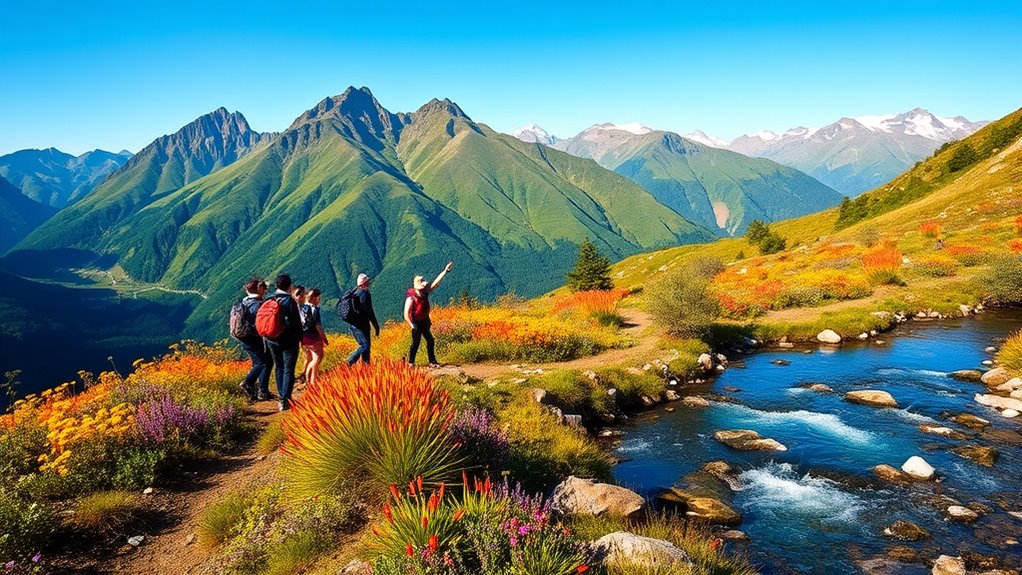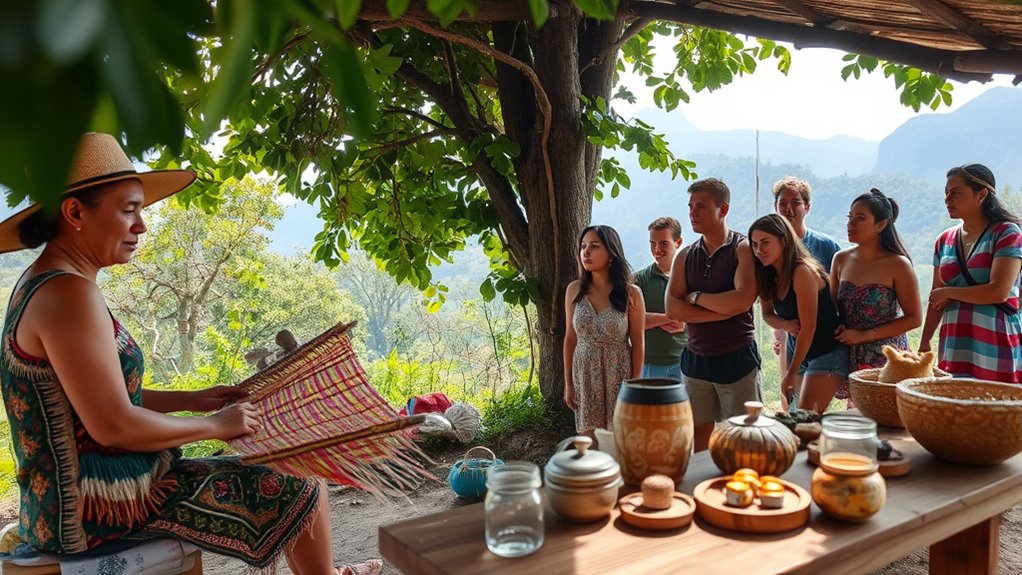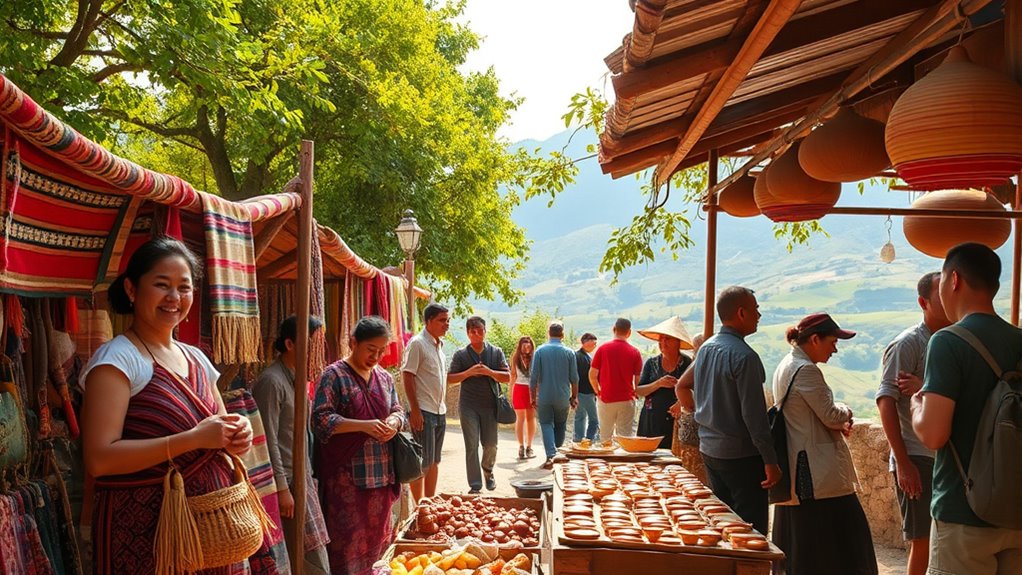Eco-tourism means traveling responsibly by protecting natural environments and supporting local communities. You can make a positive impact by choosing eco-friendly accommodations, sticking to designated trails, and respecting local customs. Getting involved with local initiatives fosters deeper connections and enhances your experience. Always consider the effects of your travel choices on the environment and community. Interested in discovering more ways to make your travels sustainable and fulfilling? There’s plenty more to explore!
Key Takeaways
- Prioritize eco-friendly accommodations and transportation to minimize your carbon footprint during travel.
- Engage with local communities, respecting their culture and supporting local businesses for an authentic experience.
- Follow “Leave No Trace” principles to protect natural areas and wildlife during your visit.
- Participate in community-led initiatives to contribute positively to local economies and cultural preservation.
- Choose sustainable activities that prioritize environmental conservation and community involvement over mass tourism.
Principles of Ecotourism

Ecotourism is all about responsible travel to natural areas, guaranteeing that you not only enjoy the beauty of the environment but also contribute to its preservation.
The principles of ecotourism emphasize sustainability, conservation, and community involvement. By traveling responsibly, you support local economies, creating financial opportunities for residents and promoting cultural awareness. Furthermore, ecotourism can generate financial benefits for both local people and private industry, enhancing the overall impact of your travels. Engaging with local communities can also lead to effective location scouting that respects the environment and cultural heritage. For instance, participating in low-impact tourism ensures that your visit does not harm the delicate ecosystems of the area. Staying at eco-friendly accommodations allows travelers to experience luxury while supporting sustainable practices.
You’ll engage with local communities, fostering relationships that celebrate their heritage and traditions. Additionally, practicing low-impact tourism helps minimize ecological footprints and supports the development of eco-friendly infrastructure.
Through these efforts, you not only enrich your travel experience but also help guarantee that natural areas remain vibrant and sustainable for future generations. Your choices can make a significant difference in preserving the environment.
Environmental Conservation Strategies

When you explore natural areas through eco-tourism, implementing effective environmental conservation strategies is crucial. Focus on minimizing your ecological impact by supporting sustainable practices. Visit national parks and wildlife reserves; your entrance fees help fund important conservation efforts. Eco-tourism also supports local communities by providing economic opportunities and preserving cultural traditions. Embrace responsible travel practices by following “Leave No Trace” principles and sticking to designated trails. Choose eco-friendly accommodations with green certifications to further your commitment to sustainability. Opt for environmentally-friendly transportation, like electric vehicles, to reduce your carbon footprint, and consider the benefits of energy monitoring features to help track and minimize resource consumption during your travels. Additionally, consider engaging in renewable energy innovations that can enhance the sustainability of your travel experience. Implementing DIY fire pit ideas can also create eco-friendly gathering spaces that connect travelers with nature.
Community Benefits of Sustainable Tourism

Sustainable tourism not only benefits the environment but also plays an essential role in uplifting local communities. It creates sustainable jobs, contributing to economic stability for you and your neighbors. By generating income for underserved populations, such as women and rural communities, it fosters entrepreneurship and supports local businesses. This stimulation of local economies enhances infrastructure development, benefiting both visitors and residents alike. Moreover, sustainable tourism encourages cultural preservation and community engagement. You’ll see an increase in local festivals and events that strengthen community ties, as tourism generates economic growth and provides resources for community initiatives. Additionally, sustainable practices in tourism can lead to improved indoor air quality and overall health for both tourists and residents. Furthermore, embracing organic farming methods in local tourism initiatives can enhance environmental sustainability and create a healthier ecosystem. Implementing water purification methods in local tourism can also ensure safe access to drinking water for both visitors and residents.
Best Practices for Responsible Travel

Traveling responsibly enhances the benefits of sustainable tourism by ensuring that your adventures positively impact local communities and the environment.
To engage respectfully, familiarize yourself with local customs and traditions—this way, you avoid unintentional offense. Choose accommodations and restaurants that support the local economy, and consider eco-friendly transportation options to reduce your carbon footprint. Additionally, supporting local businesses helps strengthen the community and provides a more authentic travel experience. Understanding the importance of sustainable building practices can also inform your choices when selecting eco-friendly accommodations. Investing in community-based tourism initiatives can further promote local culture and heritage. Furthermore, opting for local products, such as honey brands that source sustainably, can enhance your experience while supporting the environment.
Minimize waste by avoiding single-use plastics and practice reef-safe habits when visiting marine areas. Engage with locals by visiting markets and learning basic phrases in their language to foster genuine connections.
Finally, remember to respect historical sites and contribute to their preservation. By following these best practices, you’ll enrich your travels while promoting sustainability and respect for the places you explore.
Challenges Facing Ecotourism

Despite its potential to promote conservation and benefit local communities, ecotourism faces several significant challenges that can undermine its effectiveness. Excessive tourism can lead to overexploitation of natural resources, causing pollution and loss of biodiversity. Fragile ecosystems become threatened by large tourist crowds, while long-distance travel contributes to carbon emissions. The importance of responsible travel practices is often overlooked, leading to further degradation of these vulnerable areas. Additionally, hydrogen fuel cells offer a potential solution for reducing the carbon footprint associated with travel. Moreover, advancements in renewable energy technologies can significantly enhance the sustainability of travel operations. Sustainable living practices can also provide travelers with alternatives that minimize their impact on the environment.
Remote destinations often lack the necessary infrastructure, leading to inadequate waste management and discomfort for visitors. Economic instability can deter investments, resulting in uneven distribution of benefits among communities. Additionally, weak regulatory frameworks allow unsustainable practices to flourish, with some operators misusing the term “ecotourism.”
These challenges highlight the need for careful management and genuine commitment to sustainability in ecotourism initiatives.
Tips for Supporting Local Cultures and Economies

When you engage with local cultures and economies during your travels, you not only enhance your experience but also contribute to the well-being of the communities you visit.
Choose locally-owned accommodations and eateries to support small businesses. Buying local supports community development and local economy growth. Participating in community-led tourism projects, which guarantee that locals benefit from your visit, can also provide important insights into their daily lives and cultural practices. Additionally, creating spaces that are accessible and accommodating for all visitors promotes a more inclusive environment, ensuring that everyone can enjoy the beauty of aging in place. It is important to recognize that individual responses to cultural interactions can vary greatly, enhancing your understanding of local customs. Purchase handmade crafts from local artisans, preserving their cultural heritage while promoting their work.
Be mindful of cultural customs, and show respect during your interactions. Opt for eco-friendly activities that prioritize sustainability and leave no trace.
Finally, consider volunteering for local initiatives, allowing you to make a positive impact while deepening your connection with the community.
Frequently Asked Questions
What Are the Main Types of Eco-Tourism Activities Available?
When you explore eco-tourism, you’ll find various activities to engage in. You can enjoy wildlife viewing, capturing stunning nature photography, or birdwatching.
If you’re seeking adventure, try kayaking or zip-lining through breathtaking landscapes. You might also immerse yourself in local culture through community-led tours or handicraft workshops.
For those passionate about conservation, participating in tree planting or beach cleanups can be fulfilling. Each activity helps you connect with nature and local communities.
How Can I Identify Eco-Friendly Accommodations?
When it comes to finding eco-friendly accommodations, think of it like a treasure hunt.
Start by looking for certifications like EarthCheck, Green Key, or LEED, which guarantee sustainable practices. Research local policies and check for features like renewable energy, water efficiency, and local food sourcing.
Don’t forget to read reviews that highlight eco-initiatives. By doing this, you’ll uncover places that align with your values and support the environment.
Are There Certifications for Sustainable Tourism Operators?
Yes, there are several certifications for sustainable tourism operators.
You might come across the GSTC Certification, which sets global standards for sustainability in tourism. Other options include EarthCheck, Biosphere Responsible Tourism, and Green Step Certification.
Each certification has its own focus, from environmental management to aligning with the UN’s Sustainable Development Goals.
What Impact Does Climate Change Have on Eco-Tourism?
Climate change markedly impacts eco-tourism by altering natural habitats and ecosystems, which can diminish biodiversity.
You might notice coral reefs degrading due to rising temperatures, threatening marine tourism. Changes in precipitation can affect water availability for eco-tourism activities, while shifts in tourist patterns could lead you to cooler destinations.
Additionally, climate-related disasters jeopardize infrastructure, making it harder for you to enjoy these natural attractions and diminishing the overall experience of eco-tourism.
How Can I Advocate for Sustainable Tourism in My Community?
You can advocate for sustainable tourism in your community by organizing awareness campaigns that highlight its benefits.
Engage local businesses in discussions about sustainable practices, and encourage them to adopt eco-friendly initiatives.
Collaborate with community leaders to develop tourism strategies that reflect local needs.
Create educational programs to inform residents about conservation efforts and the importance of supporting local economies.
Finally, foster partnerships among stakeholders to amplify your impact and drive meaningful change.
Conclusion
To sum up, by embracing eco-tourism, you’re not just enjoying breathtaking landscapes; you’re also making a positive impact. Did you know that studies show ecotourism can generate up to 30% more revenue for local communities compared to traditional tourism? By choosing responsible travel practices, you help preserve the environment and uplift local economies. So, next time you venture out, remember your choices matter—by traveling responsibly, you’re contributing to a sustainable future for both nature and communities.










